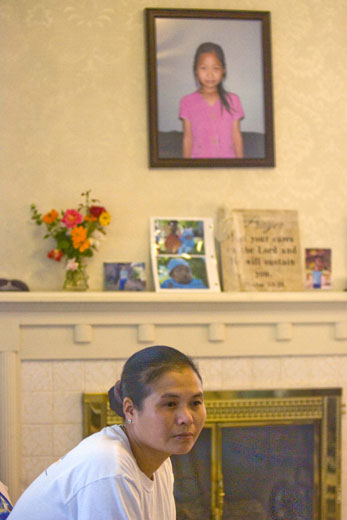
Parents face delays, confusion in a slow wait for justice
By Julia Lyon | The Salt Lake Tribune
Cartoon walked across the flat, grassy expanse of Elysian Burial Gardens and gently placed Hser Ner Moo’s polka-dotted sunglasses by her brown and gray stone. He sometimes visited twice a day, before and after his shift as a dishwasher at The Original Pancake House in Salt Lake City.
Whenever a family came into the restaurant with a girl Hser Ner Moo’s age, his eyes filled with tears.
Every night before bed, he looked at a cell phone photo of her wearing a pink shirt and sunglasses. Her voice had tugged him awake each morning. The memories made it hard for him to sleep. Some evenings Pearlly found him standing and crying at her grave, his arms folded at his chest.
There was a fierceness to his grief. Unable to articulate his thoughts in English, his unwavering stare spoke for him. “My daughter die, me die,” Cartoon said simply.
Pearlly worried her husband would lose his mind.
Soon after the murder, the family moved from the apartment complex to a red-brick bungalow in a leafy Sugar House neighborhood. Over the fireplace, they hung a large framed photo of Hser Ner Moo taken the day before she died. A bookcase of photos looked like a shrine.
They watched Fourth of July fireworks while Eh Ler Wah, then 5-months-old, sat on Cartoon’s shoulders. He was the family’s first American citizen, both a distraction and a blessing.
“We came here as six, now we still are six,” Pearlly realized.
But the high rent on the house led the family to move again earlier this year, to an apartment in Cottonwood Heights. Sometimes Pearlly would wake at night and find her husband in the living room, crying, looking at pictures of Hser Ner Moo.
By this fall, a year and a half had passed since Hser Ner Moo’s death. The baby, Eh Ler Wah, was walking. Their son Sunday had grown a head taller. And their two eldest sons had moved away to Nebraska, trying to escape their grief over their lost sister.
Her parents still had not been able to confront the man accused of causing them so much pain.
“We don’t know, we don’t understand what’s happening,” Cartoon said. “And we’re not even sure justice is going to be served.”
The case against Esar Met has moved slowly, complicated by questions about his mental competency, the lack of a birth record to confirm his age and language barriers.
Salt Lake County District Attorney Lohra Miller visited Hser Ner Moo’s family early on to talk about the case. As months passed and letters came from the court, a family friend tried to explain them in simple English. The family attended another meeting, but it was interpreted into Thai, a language Pearlly doesn’t completely understand.
Cartoon kept asking for time off, only to learn hearings were postponed. He worried about his reputation at work. Furious about the repeated cancellations, Pearlly eventually threw away the stack of letters from the court.
“I feel hopeless,” she said. “Nobody tells us any certain thing.”
A cousin in Iowa told Cartoon about a meat processing plant where there were good jobs. So in late September, Cartoon paid $150, climbed aboard a bus and rode east for two days.
On the way, he watched the cornfields and thought about Thailand.
He arrived in Marshalltown, Iowa, population roughly 26,000, just as the high school football team was having the best season in its history. Cartoon stayed with his cousin, down the road from the school where Bobcat fans cheered exuberantly on Friday nights.
Just as his cousin predicted, he soon got a job working Monday through Saturday and told Pearlly he was going to stay.
As he sliced the fat off the pork, Cartoon sometimes thought about Hser Ner Moo all day.
Advance to the next chapter :: Return to the table of contents

 /a>
/a>


















 /a>
/a>

















